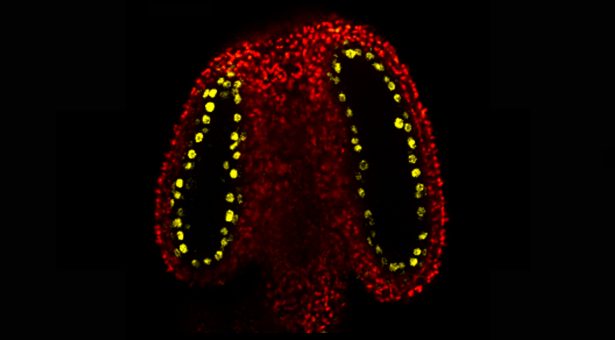
Study Shows Information Beyond Genetic Code is Stored in Plant Sperm
July 7, 2021| |
Researchers from John Innes Centre identified a mechanism which adjusts modifications in the DNA to alter the way information beyond the genetic sequence is passed down onto next generations.
The researchers have discovered the mechanism of DNA methylation in reprogramming the male germ line of Arabidopsis plants. DNA methylation is an example of epigenetic modification. It happens when a methyl group is added to the DNA to switch a gene on or off. As the germ line cells develop, some of the methyl markers are reset which affects the information passed on to its offspring. The researchers also found the protein, CLSY3, in the tapetal cells in the anther that causes the production of large amounts of small RNA molecules to nourish the cells which divide to form the sperm in the anthers.
The small RNA molecules were shown to move from tapetal cells into the sperm. The researchers then added new methyl marks to unstable genetic elements with the same DNA code to prevent the unstable genes from jumping around the germ cells and protecting the integrity of the genome between generations.
The results of the study could help develop new biotechnology approaches in seed formation and breeding in commercial crops such as maize and rice because these crops were shown to have similar tapetal cells with Arabidopsis.
For more details, read the press release of the John Innes Center and the journal article in Science.
| |
You might also like:
- Scientists Discover Genetic Trigger for Asexual Plant Reproduction
- Researchers Unveil Mechanism that Regulates Plant Reproduction
- Companion Cell Protects Sperms from Genetic Damage
Biotech Updates is a weekly newsletter of ISAAA, a not-for-profit organization. It is distributed for free to over 22,000 subscribers worldwide to inform them about the key developments in biosciences, especially in biotechnology. Your support will help us in our mission to feed the world with knowledge. You can help by donating as little as $10.
-
See more articles:
-
News from Around the World
- Can Gene Drive Eliminate Vector-borne Diseases?
- Researchers Combine Resistance Genes to Improve Wheat Yields
- Cow's Gut Microbes Can Degrade Three Types of Plastics
- Drought Tolerant Rice Comparatively Safe With Non-GM Counterpart
- Study Shows Information Beyond Genetic Code is Stored in Plant Sperm
- Wageningen Scientists Discover how Potato Blight Pathogen Penetrates Plants
-
Plant
- Russia's First Gene-Edited Calf Turns One
- Study Reveals Role of OsMTD2 in Rice Pollen Tube Elongation
- Scientist Introduces CRISPR 3.0 System for Highly Efficient Gene Activation in Plants
- Japanese Researchers Develop New Gene-Editing Tool to Create Non-GM Crops
- Scientists Propose Ethical Guidelines to Assess GM, GEd Organisms
-
Health
- Facemask Detects COVID-19 Virus in 90 Minutes
-
Read the latest: - Biotech Updates (February 11, 2026)
- Gene Editing Supplement (January 28, 2026)
- Gene Drive Supplement (February 22, 2023)
-
Subscribe to BU: - Share
- Tweet

